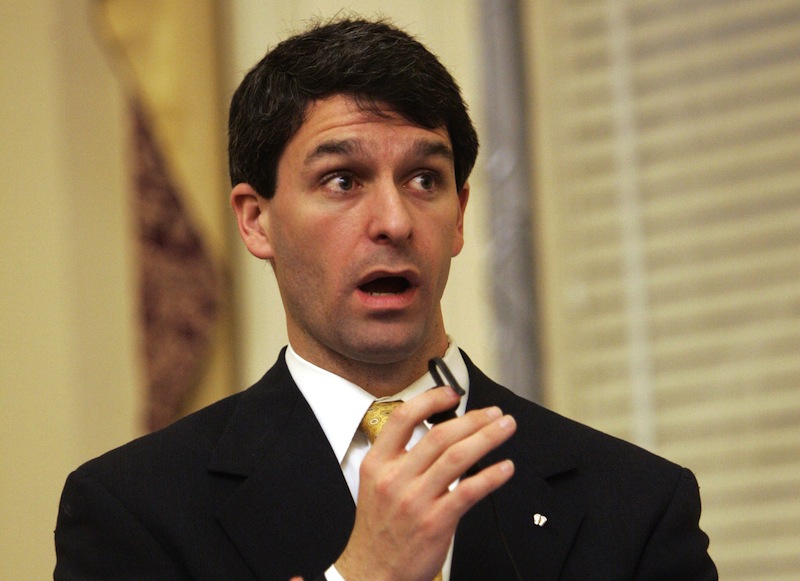RICHMOND, Va. (AP) — Virginia is conducting nothing short of a grand political experiment in 2013, testing whether a tea party favorite can carry a closely divided state with conservative roots. If Ken Cuccinelli wins the race for governor, he will have undercut Republican moderates’ claims that hard-right ideologies are hurting the party — and undoubtedly intensify a debate already roiling the GOP.
Despite its Southern conservative history, Virginia is not Kansas or Oklahoma. President Barack Obama carried it twice after years of Republican dominance, and both U.S. senators are Democrats. Democrats and Republicans have battled fiercely for control of the state Legislature and governorship for years, with Republicans holding the edge lately.
It’s hard to find a more 50-50 state where moderate and independent voters loom large in fall general elections.
Cuccinelli, the fiery attorney general running for governor this year, is no garden variety conservative. He once told college leaders they couldn’t ban anti-gay discrimination. He advised Catholic clergy to go to jail to protest federal contraceptive coverage mandates. He investigated a former Virginia scientist over his climate change research. All this gave Cuccinelli a national profile few attorneys general attain.
His in-your-face conservatism contrasts with the more measured style of successful Republicans in other toss-up states, including Pat McCrory, North Carolina’s first Republican governor in 20 years.
Some Virginia Republicans had hoped to thwart Cuccinelli’s nomination, fearing he’s too extreme for the swing state. But a conservative takeover of the state party last summer ensured it.
A more moderate Republican recently decided against an independent candidacy, and GOP officials are rallying around Cuccinelli in his Nov. 5 showdown with Terry McAullife. The former national Democratic Party chairman and New York native was a major fundraiser for Bill and Hillary Clinton.
Some GOP strategists nervously point to states where Republicans lost winnable elections in 2010 and 2012 after tea party-backed candidates wrested the nominations from moderates.
Most of those races were for the Senate, however. It’s hard to know if similar dynamics will play out in a gubernatorial race in an off-year election, when no federal candidates are on the ballot.
For now, Democrats are optimistic.
“They must be saying, ‘Once more the Republicans have given us a gift,'” said Steve Jarding, a veteran Virginia Democratic strategist now teaching at Harvard.
He said Virginia Republicans should view the intraparty tension “sort of like a cancer. You’ve got to remove it early or you risk killing the party.”
Cuccinelli used a high-profile setting this month to make nods toward the political center. Addressing the Conservative Political Action Conference near Washington, he went relatively easy on the red-meat lines that conservatives eat up, and used phrases seldom heard at the often bombastic annual convention.
He called for greater support for the mentally ill and for felons who may have been wrongly convicted. Virginia must “protect our most vulnerable citizens,” he said, “at every stage of life.” That seemed an indirect reference to opposing abortion, something he usually hits head-on.
Cuccinelli needn’t look far to see the challenges for a conservative champion trying to moderate his record. In fact, he has complicated similar efforts by Virginia’s current GOP governor, Bob McDonnell, who is seen as having presidential ambitions.
A tea party group aired ads in Iowa and New Hampshire attacking McDonnell for bipartisan legislation to reshape Virginia’s failing transportation funding system, which includes some new taxes. In a twist, Cuccinelli vigorously opposed and nearly scuttled the transportation deal. But McAuliffe backed it.
The Iowa ad, narrated by Virginia Tea Party Federation past chairman Jamie Radtke, said McDonnell’s transportation deal broke a 2009 campaign promise never to raise taxes. “Remember, you can’t believe a word he says,” it concluded.
McDonnell, a top Mitt Romney liaison with conservatives just a few months ago, was not invited to speak at CPAC. “You stick to your conservative principles but you focus on results and not just on rhetoric,” McDonnell said of the snub.
Veteran GOP strategist Charlie Black said Cuccinelli is in trouble if he can’t unify his party and expand his image beyond social conservatism.
“Yes, he’s a strong social conservative, but he’s not leading with that in the campaign,” Black said. “I think he’ll be prepared with answers for all of that.”
In a new Quinnipiac University poll, 32 percent of Virginia voters said Cuccinelli’s political philosophy is “about right,” while 29 percent said he is too conservative and 5 percent said he is too liberal. One-third of voters had no opinion. The poll found that neither Cuccinelli nor McAuliffe is well-known among state voters.
McDonnell isn’t the only socially conservative governor who has drawn fire from the right for pivoting toward the center on fiscal issues.
In Florida, Gov. Rick Scott, a former hospital corporation executive whose loathing of Obama’s health care law fueled his candidacy, was excoriated by tea partyers for last month’s about-face to expand Medicaid in Florida.
Similar criticisms have fallen on Republican governors John Kasich of Ohio, Jan Brewer of Arizona and Rick Snyder of Michigan for agreeing to Medicaid expansions under “Obamacare.”
Cuccinelli’s success or failure in Virginia will cause ripples across the country.
“What we’re seeing is the outgrowth of the divide we’ve seen coming in the Republican Party for quite some time,” said Virginia Beach tea party activist Karen Miner Hurd. “In the Republican Party organization nationally, you’re seeing this play out.”
Asked what the GOP will look like in four of five years, Hurd replied, “That depends on whether the Republican Party survives.”
___
Babington reported from Washington.
Copyright 2013 The Associated Press.






